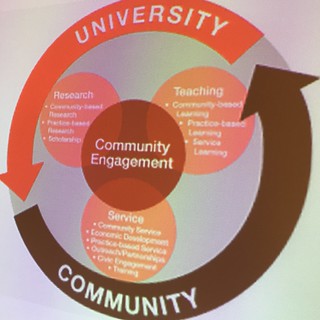Teaching the ACRL Framework: Reflections from the field
Melissa Gross, Don Latham, Heidi Julien
The ACRL Framework for Information Literacy for Higher Education was adopted January 2016.
They did a national survey of instructional librarians. 622 responses. Respondents were generally positive about the Framework. Most had yet to modify their Information literacy instruction in significant ways,
They then did a interview study with 15 instructional librarians. Semi structured questions. Conducted through Skype. Looked for successes, challenges, and evaluation techniques. Asked about pedagogy techniques.
Pedagogical strategies:
- Framework provides for structure
- Provides guiding ideology
- More conversational
- More hands on, peer to peer teaching
Most successful strategies:
- Conversations or training with other librarians on site
- Ditto with faculty
- Using the frame to develop learning outcomes
- Implementing the frames over time
Greatest challenges:
- Time
- Concepts are vague
- Scalability
- Librarian resistance to the Framework
- Requires lots of preparation
- Buy in from faculty
- Faculty still want skills-based instruction
Respondents noted a wide variety of ways for assessing student learning, including no assessments yet.
Discussion:
- The Framework does require a change in thinking.
- Difficult to fit the Framework into the typical one shot session
- Harder to assess student assimilation of Framework ideas
- Librarian attitudes about the Framework vary.
Implications for LIS education:
- We should encourage our students to engage in critical reflection and debate about the frameworks strengths and weaknesses.
- We should move away from a strictly skills based approach.
- Need to help student develop assessments
There is more research that needs to be done on the adoption of the Framework.
What are best practices in LIS programs for teaching students to then teach using the Framework?
E-Advising: Expanding Advising for Distance LIS Students
Sue Kimmel, Elizabeth Burns, Jeffrey DiScala, Meredith Parker - Old Dominion Univ.
Challenges:
- Navigating online systems and technologies
- Lack of confidence
- Need for advising and support services
- Lack of contact with faculty or a designated program coordinator
- Need for more detailed information about university expectations
- Access during university business hours
They have:
- Online office hours
- Blackboard site that hold info that students will need
- A lecturer as an overarching advisor from first contact through graduation
Students actually want help 24x7.
Their students are nontraditional with jobs and family. Few access existing resources for help.
Students into program complete coursework during times other than traditional business hours. After 6 p.m. and on the weekend.
At the time of their survey, they did have a requirement that students come to campus for a three day boot camp (summer institute).
For ODU students, online, asynchronous learning was very important. They would not have been able to enroll otherwise. Most of their students are from Virginia. All are school media students.
What do their students perceive to be the benefits on online advising?
Why do students seek assistance?
- Plan of study - most frequent
- Registration financial aid
- Technology
- Program advise
- Navigating the ODU website
- Conflicts with groups
- Other requirements
What resources do they used? Most frequent:
- Email my advisor
- Online office hours
- Classmates
- Email the instructor
Online advising is seen as being convenient. It allows students to feel a sense of community.
Improvements and adjustments:
- More frequent access to the program advisor
- Promote the resources more frequently
- Obtain more advanced notice of deadlines, etc.
- Standardize office hours across courses and faculty
(Re)Discovering LIS Education Identity, Image, and Purpose in Engaged Scholarship
Laurie Bonnici, Jinxuan Ma
“...increasing difficulty in maintaining coherence of identity, image, and purpose.” - Cronin, 2002
Their research is using the @BlueZones and their work is not yet finished.
Engaged scholarship: education applied to social problems and issues faced by individuals, local communities, organizations, practitioners, and policymakers.
Community engaged learning is a course, internship, or program in an institution of higher education that includes:
- Working with the community
- Addressing societal needs
- Intentional integration of learning objectives
- Student preparation, ongoing reflection, and critical analysis
- Reciprocal benefits
- Ability to explore one’s civic identity
Community engagement is at the center of research, teaching, and service.

No comments:
Post a Comment